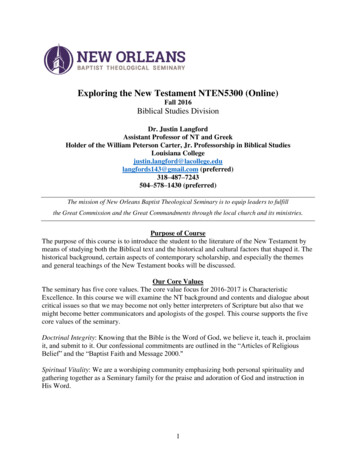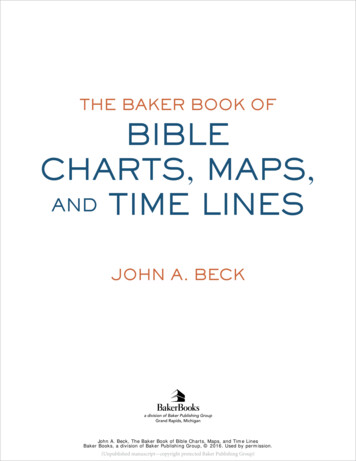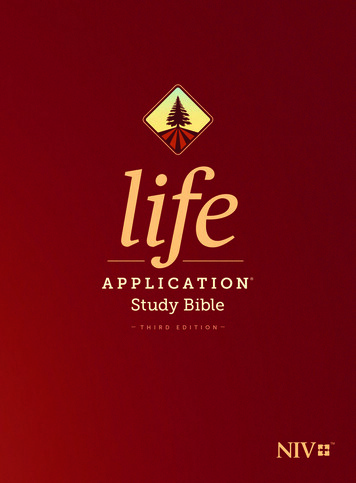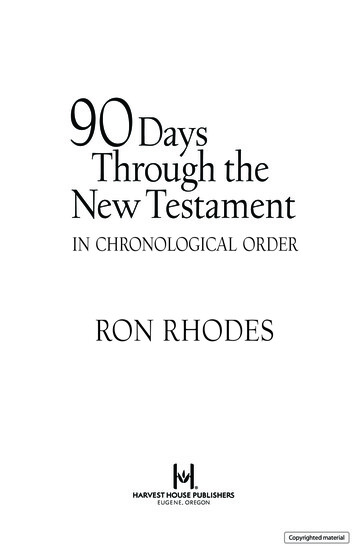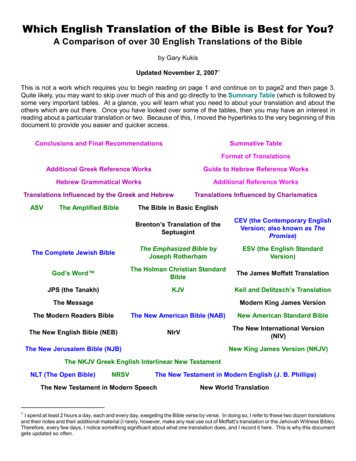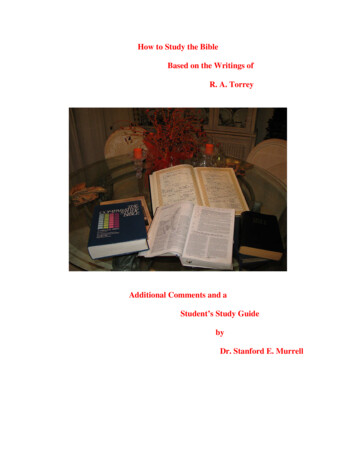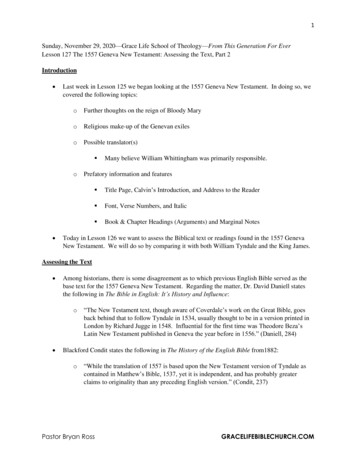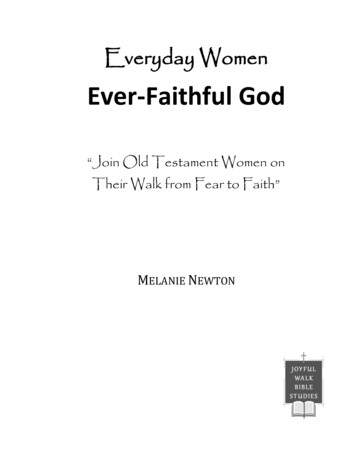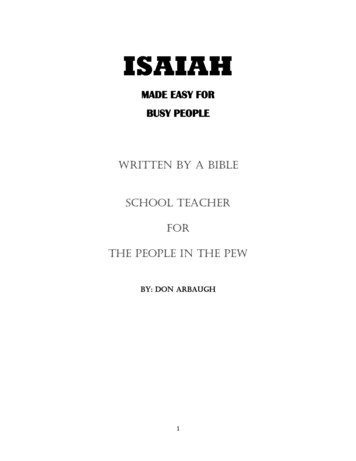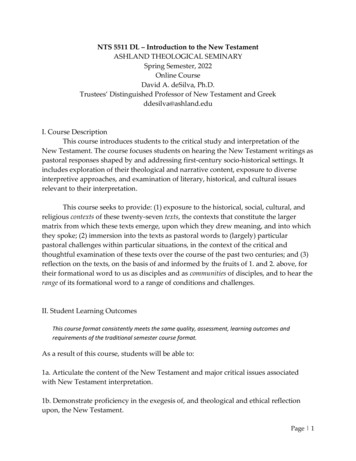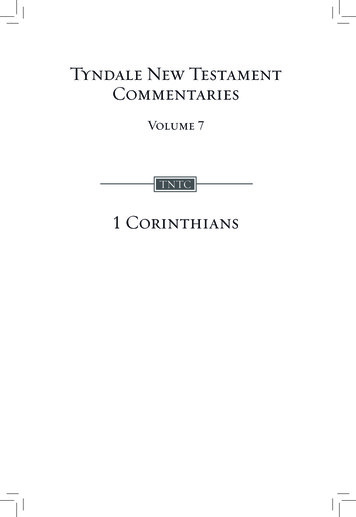
Transcription
Tyndale New TestamentCommentariesVolume 7TNTC1 Corinthians
1 Corinthians master:Layout 13/6/0811:47Page 2
Tyndale New TestamentCommentariesVolume 7General Editor: Leon Morris1 CorinthiansAn Introduction and CommentaryLeon Morris
InterVarsity Press, USAP.O. Box 1400Downers Grove, IL 60515-1426, USAWorld Wide Web: www.ivpress.comEmail: email@ivpress.comInter-Varsity Press, EnglandNorton StreetNottingham NG7 3HR, EnglandWebsite: www.ivpbooks.comEmail: ivp@ivpbooks.com Leon Morris 1985Leon Morris has asserted his right under the Copyright, Designs and Patents Act, 1988, to be identified as Author ofthis work.All rights reserved. No part of this publication may be reproduced, stored in a retrieval system or transmitted in any formor by any means, electronic, mechanical, photocopying, recording or otherwise, without the prior permission of InterVarsityPress.InterVarsity Press , USA, is the book-publishing division of InterVarsity Christian Fellowship/USA www.intervarsity.org and a member movement of the International Fellowship of Evangelical Students.Inter-Varsity Press, England, is closely linked with the Universities and Colleges Christian Fellowship, a student movementconnecting Christian Unions in universities and colleges throughout Great Britain, and a member movement of the International Fellowship of Evangelical Students. Website: www.uccf.org.uk.All Scripture quotations, unless otherwise indicated, are taken from the Holy Bible, New International Version . NIV .Copyright 1973, 1978, 1984 by International Bible Society. Used by permission of Zondervan Publishing House. Distributed in the U.K. by permission of Hodder and Stoughton Ltd. All rights reserved. “NIV” is a registered trademark ofInternational Bible Society. UK trademark number 1448790.The diagrams on pp. 128, 129 and 226 are by the American School of Classical Studies, Athens, and are used by permission.First edition 1958Second edition 1985Reprinted in this format 2008USA ISBN 978-0-8308-4237-7UK ISBN 978-1-84474-273-8Set in Garamond 11/13ptTypeset in Great Britain by Avocet Typeset, Chilton, Aylesbury, BucksPrinted in the United States of America InterVarsity Press is committed to protecting the environment and to the responsible use of naturalresources. As a member of the Green Press Initiative we use recycled paper whenever possible. To learnmore about the Green Press Initiative, visit www.greenpressinitiative.org .Library of Congress Cataloging-in-Publication DataMorris, Leon, 1914-2006.1 Corinthians: an introduction and commentary/Leon Morris.p. cm.—(Tyndale New Testament commentaries; v. 7)Originally published: 1985.Includes bibliographical references.ISBN 978-0-8308-4237-7 (pbk.: alk. paper)1. Bible. N.T. Corinthians, 1st—Commentaries. I. Title.BS2675.53.M67 2008227’.207—dc222008031510British Library Cataloguing in Publication DataA catalogue record for this book is available from the British 1201918171681576145
1 Corinthians master:Layout 13/6/0811:47Page 5CONT ENTSGeneral prefaceAuthor’s preface to the first editionAuthor’s preface to the second editionChief abbreviations Introduction BackgroundPaul at CorinthPaul’s subsequent relations with the church at CorinthThe occasion and purpose of CorinthiansThe authenticity of the EpistleThe date and place of origin Analysis Commentary Fig. The Asclepion at CorinthFig. The dining rooms of the AsclepionFig. A typical villa at Anaploga, in Corinth
1 Corinthians master:Layout 13/6/0811:47Page 6
1 Corinthians master:Layout 13/6/0811:47Page 7GE NE RAL PREFACEThe original Tyndale Commentaries aimed at providing help for thegeneral reader of the Bible. They concentrated on the meaning ofthe text without going into scholarly technicalities. They sought toavoid ‘the extremes of being unduly technical or unhelpfully brief ’.Most who have used the books agree that there has been a fair measure of success in reaching that aim.Times, however, change. A series that has served so well for solong is perhaps not quite as relevant as it was when it was firstlaunched. New knowledge has come to light. The discussion of critical questions has moved on. Bible-reading habits have changed.When the original series was commenced it could be presumedthat most readers used the Authorized Version and comments weremade accordingly, but this situation no longer obtains.The decision to revise and update the whole series was notreached lightly, but in the end it was thought that this is what isrequired in the present situation. There are new needs, and they willbe better served by new books or by a thorough updating of the oldbooks. The aims of the original series remain. The new commentaries are neither minuscule nor unduly long. They are exegeticalrather than homiletic. They do not discuss all the critical questions,but none is written without an awareness of the problems thatengage the attention of New Testament scholars. Where it is felt thatformal consideration should be given to such questions, they are discussed in the Introduction and sometimes in Additional notes.But the main thrust of these commentaries is not critical. These
1 Corinthians master:Layout 1 3/6/0811:47Page 8 CORINTHIANSbooks are written to help the non-technical reader understand hisBible better. They do not presume a knowledge of Greek, andall Greek words discussed are transliterated; but the authors have theGreek text before them and their comments are made on the basisof what the originals say. The authors are free to choose their ownmodern translation, but are asked to bear in mind the variety oftranslations in current use.The new series of Tyndale Commentaries goes forth, as theformer series did, in the hope that God will graciously use thesebooks to help the general reader to understand as fully and clearlyas possible the meaning of the New Testament.Leon Morris
1 Corinthians master:Layout 13/6/0811:47Page 9AUT HOR’S P REFACE TO THE FIRSTE DIT I ONIt is no new observation that the letters of St Paul are not easy reading ( Pet. : f.), but for him who is prepared to take time andtrouble their study is immensely rewarding. Not least is this the casewith Corinthians, a letter arising out of the practical difficultiesbesetting a far-from-ideal first-century Greek church. Here we havea typical Pauline letter. The apostle praises his correspondents fortheir Christian virtues, and rebukes them roundly for their many failings. He adds to their knowledge with some great passages, notablyhis discussion of love in chapter and of the resurrection inchapter . Whatever he touches he deals with in the light of greatChristian principles. He sees things temporal always in the light ofthings eternal. What he writes has relevance to our own, in manyways very different, needs. He shows us how to take our problemsback to the light shed upon them by the great Christian verities. Wecannot fail to profit as we ponder his words.In writing this commentary I have been greatly indebted to verymany. Notably is this the case with regard to the commentaries towhich I have referred in the notes. I have endeavoured to indicatemy many indebtednesses in specific matters, but I have learnedmore from my predecessors than I can sufficiently acknowledge. Ihave also found some modern translations very helpful, for what aretranslations but compressed commentaries?Finally I would like to express my gratitude to Miss G. Mahar andMiss M. McGregor who very kindly typed the manuscript for me.Leon Morris
1 Corinthians master:Layout 13/6/0811:47Page 10
1 Corinthians master:Layout 13/6/0811:47Page 11AUT HOR’S P REFACE TO THE SECONDE DI T IONThe call for a new edition of this commentary has given me theopportunity of working through the material again, with the help ofmuch that has been written in the years since the first editionappeared. I have been grateful for the commentaries to which I havereferred, and especially to those by Barrett and Conzelmann.The change from the Authorized Version to the New International Version as the base has meant many small alterations, andI have gone further and rewritten the whole. It is essentially the samecommentary, though here and there the reader may notice a changeof emphasis and even sometimes of opinion.It may help the general reader if I point out that all crossreferences have been checked against the Greek text; a reference tothe English translation will not always make this clear. For example,I speak of Paul’s calling himself a ‘slave of Christ’ and refer toRomans : . Now NIV has there ‘a servant of Christ’ and the English reader may wonder a little about the accuracy of the reference.But ‘servant’ translates doulos, which means ‘slave’. Despite NIV,Paul really did call himself ‘a slave of Christ’. It would have taken upa lot of space to make this sort of thing clear on every occasion, soI have often simply given the reference. But, as I have said, onevery occasion the reference has been checked against the Greek.It remains only for me to express the hope that in its new formatthis commentary will meet a continuing need. And to express my
1 Corinthians master:Layout 1 3/6/0811:47Page 12 CORINTHIANSappreciation to Mrs D. Wellington, my former secretary, for her kindness in typing the manuscript so expertly.Leon Morris
1 Corinthians master:Layout 13/6/0811:47Page 13CHI EF RLBruceG. Abbott-Smith, A Manual Greek Lexicon of theNew Testament (T. & T. Clark, ).The Authorized (or King James’) Version.A Greek-English Lexicon of the New Testament andOther Early Christian Literature (trans. of W. Bauer,Griechisch-Deutsches Wörterbuch), ed. by William F.Arndt and F. Wilbur Gingrich; second ed. rev. andaugmented by F. W. Danker (University of ChicagoPress, ).William Barclay, The Letters to the Corinthians (SaintAndrew Press, ; Daily Study Bible).C. K. Barrett, A Commentary on the First Epistle to theCorinthians (Black, ; Black’s New TestamentCommentary).F. Blass and A. Debrunner, A Greek Grammar of theNew Testament and Other Early Christian Literature,trans. and rev. by Robert W. Funk (CambridgeUniversity Press, ).J. Agar Beet, A Commentary on St. Paul’s Epistles to theCorinthians (Hodder & Stoughton, ).J. A. Bengel, Gnomon of the New Testament (T. & T.Clark, ).The Bulletin of the John Rylands Library.F. F. Bruce, and Corinthians (Marshall, Morgan &Scott, ; New Century Bible ).
1 Corinthians master:Layout 1 3/6/0811:47Page 14 CORINTHIANSJohn Calvin, The First Epistle of Paul the Apostle to theCorinthians, trans. by J. Pringle (Calvin TranslationSociety, ).CBQThe Catholic Biblical Quarterly.Conzelmann Hans Conzelmann, Corinthians (SCM Press, ).CraigClarence T. Craig, The First Epistle to the Corinthians(Abingdon, ; The Interpreter’s Bible, vol. ).DeluzGaston Deluz, A Companion to Corinthians(Darton, Longman & Todd, ).EdwardsThomas Charles Edwards, A Commentary on the FirstEpistle to the Corinthians (Hodder & Stoughton, ).EllicottCharles J. Ellicott, St Paul’s First Epistle to theCorinthians (Longmans, Green & Co., ).ErdmanCharles R. Erdman, The First Epistle of Paul to theCorinthians (Westminster, ).EVVEnglish Versions (the Authorized Version and theRevised Version).FindlayG. G. Findlay, St. Paul’s First Epistle to the Corinthians( ; Eerdmans reprint ; The Expositor’s GreekTestament).GNBGood News Bible: Today’s English Version, .GodetF. L. Godet, Commentary on First Corinthians ( ;Kregel reprint ).GoudgeH. L. Goudge, The First Epistle to the Corinthians(Methuen, ).GrammarA. T. Robertson, A Grammar of the Greek NewTestament in the Light of Historical Research (Hodder &Stoughton, n.d.).GreenMichael Green, To Corinth with Love (Hodder &Stoughton, ).GrosheideF. W. Grosheide, Commentary on the First Epistle to theCorinthians (Marshall, Morgan & Scott, ; NewLondon Commentary).GrudemWayne A. Grudem, The Gift of Prophecy in Corinthians (University Press of America, ).HDBJames Hastings (ed.), A Dictionary of the Bible, vols. (T. & T. Clark, – ).Calvin
1 Corinthians master:Layout 13/6/08CHIEF age 15 Jean Héring, The First Epistle of Saint Paul to theCorinthians (Epworth Press, ).N. Hillyer, ‘ and Corinthians’ in the New BibleCommentary, Third Edition (IVP, ).Charles Hodge, An Exposition of the First Epistle tothe Corinthians (Nisbet, ).John Coolidge Hurd, Jr, The Origin of Corinthians(SPCK, ).C. F. D. Moule, An Idiom Book of New TestamentGreek (Cambridge University Press, ).The Interpreter’s Dictionary of the Bible, vols.(Abingdon, ); supplementary vol. ( ).The International Standard Bible Encyclopaedia, vols.(Howard Severance, ; rev. ed., vols,Eerdmans, – ).The Jerusalem Bible, .Journal of Biblical Literature.J. D. Jones, An Exposition of First Corinthians (Klock & Klock reprint, ).The Journal of Theological Studies.W. Kay, A Commentary on the Two Epistles of St. Paulto the Corinthians (Macmillan, ).Adolf Deissmann, Light from the Ancient East, trans.by L. R. M. Strachan (Hodder & Stoughton, ).The Living Bible, .R. C. H. Lenski, The Interpretation of St. Paul’s Firstand Second Epistles to the Corinthians (Augsburg, ).J. B. Lightfoot, Notes on Epistles of St. Paul(Macmillan, ).A Greek-English Lexicon, compiled by H. G. Liddelland R. Scott, rev. and augmented by H. S. Jonesand R. McKenzie, vols. (Oxford University Press, ).The Septuagint Version.W. H. Mare, Corinthians (Zondervan, ; TheExpositor’s Bible Commentary, vol. ).
1 Corinthians master:Layout 1 MetzgerMMMoffattNASBNEBNIVNTSOrr e 16 CORINTHIANSBruce M. Metzger, A Textual Commentary on theGreek New Testament (United Bible Societies, ).J. H. Moulton and G. Milligan, The Vocabulary of theGreek Testament (Hodder & Stoughton, – ).James Moffatt, The First Epistle of Paul to theCorinthians (Hodder & Stoughton, ; MoffattNew Testament Commentary).The New American Standard Bible, .The New English Bible, Old Testament, ;New Testament, .The Holy Bible: New International Version, OldTestament, ; New Testament, .New Testament Studies.William F. Orr and James Arthur Walther, Corinthians (Doubleday, ).R. St John Parry, The First Epistle of Paul the Apostleto the Corinthians (Cambridge University Press, ;The Cambridge Greek Testament ).W. C. G. Proctor, ‘ Corinthians’ in The New BibleCommentary (Inter-Varsity Fellowship, ).J. H. Moulton, A Grammar of New Testament Greek,vol. i, Prolegomena (T. & T. Clark, ).Alan Redpath, The Royal Route to Heaven (Revell, ).F. W. Robertson, Expository Lectures on St. Paul’sEpistles to the Corinthians (King, ).Archibald Robertson and Alfred Plummer, ACritical and Exegetical Commentary on the First Epistle ofSt Paul to the Corinthians (T. & T. Clark, ;International Critical Commentary).The Holy Bible, Revised Standard Version, OldTestament, ; New Testament, .J. Ruef, Paul’s First Letter to Corinth (SCM Press, ; Pelican New Testament Commentary).The Revised Version, .Lewis B. Smedes, Love within Limits (Eerdmans, ).Jerome Murphy-O’Connor, St. Paul’s Corinth
1 Corinthians master:Layout 13/6/08CHIEF son11:47Page 17 (Glazier, ).Theological Dictionary of the New Testament, trans. byG. W. Bromiley of Theologisches Wörterbuch zum neuenTestament, vols. (Eerdmans, – ).Gerd Theissen, The Social Setting of PaulineChristianity (T. & T. Clark, ).Margaret E. Thrall, The First and Second Letters ofPaul to the Corinthians (Cambridge University Press, ; Cambridge Bible Commentary).Tyndale New Testament Commentary.Tyndale Old Testament Commentary.C. S. C. Williams, ‘I and II Corinthians’ in Peake’sCommentary on the Bible, ed. by M. Black and H. H.Rowley (Nelson, ).Geoffrey B. Wilson, Corinthians (Banner of Truth, ).The translations by E. J. Goodspeed, R. Knox, J. B. Phillips, H. J.Schonfield, A. S. Way and R. F. Weymouth are cited by thetranslator’s surname.
1 Corinthians master:Layout 13/6/0811:47Page 18
1 Corinthians master:Layout 13/6/0811:47Page 19I N T RO D U C T I O N . BackgroundThe geographical position of Corinth, on the narrow neck of landbetween the Corinthian Gulf (where its port was Lechaeum) and theSaronic Gulf (and the port of Cenchrea) guaranteed its commercialprosperity. Merchants and sailors sent goods across the isthmusrather than risk the long voyage round the rocky, storm-tossedcapes at the south of the Peloponnesus. Trade routes from east towest intersected those from north to south at this city. Corinth wastotally destroyed by the Roman, L. Mummius Achaicus, in BC, . See G. E. Wright and F. V. Filson, The Westminster Historical Atlas to theBible (SCM Press, ), pp. , f. This meant transhipping cargoes,but small vessels were hauled across the isthmus ‘by means of a shiptramway with wooden rails’ according to J. E. Harry (ISBE, ii, p. ).Strabo calls it the diolkos (Geography . . ). Nero tried to cut a canal, butwithout success. The modern canal follows the route planned by Nero.
1 Corinthians master:Layout 1 3/6/0811:47Page 20 CORINTHIANSbut when it was refounded a century later as a Roman colony itspeedily regained much of its former greatness.As the new city was a Roman colony, its inhabitants were at firstRomans. Eventually Greeks came back in numbers and the cityalso attracted people from other races. Included among them was aJewish population large enough to have a synagogue (Acts : ). The Roman element is illustrated by the number of Latin namesassociated with Corinth in the New Testament, such as Lucius, Tertius, Gaius, Erastus, Quartus (Rom. : – ), Titius Justus, Crispus(Acts : – ), Fortunatus and Achaicus ( Cor. : ). But Greekways of thought lie behind some of the questions raised in Paul’s letters to Corinth and the manner in which they are treated. Edwardssays of Corinth: ‘Of Greek cities the least Greek, it was at this timethe least Roman of Roman colonies.’ It was a city where ‘Greeks,Latins, Syrians, Asiatics, Egyptians, and Jews, bought and sold,laboured and revelled, quarrelled and hob-nobbed, in the city and itsports, as nowhere else in Greece’. Old Corinth had been a by-word for licentiousness, and thishotch-potch of races would have hastened the process by which the . An inscription on part of the lintel of a synagogue has been found. It isagreed that this is later than the time of Paul, but it may show the site(L AE, p. , n. ; G. E. Wright, An Introduction to Biblical Archaeology[Duckworth, ], p. ). . Parry sees evidence of the Roman character of the city in that it was thefirst city of Greece to admit the gladiatorial games (p. ix). Robertson andPlummer maintain that by New Testament times the descendants of theoriginal Italian colonists ‘had become to a large extent Hellenized’ (p. xi).Corinth’s population was a medley of races which had apparentlyretained most of the worst features of the original stocks. . Edwards, p. xii. . Moffatt, p. xvii. . There were more than a thousand prostitutes connected with the templeof Aphrodite in old Corinth (Strabo, . . ). This goddess could bestyled Aphrodite Kallipygos, ‘Aphrodite of the Beautiful Buttocks’(Athenaeus, . c). Shrines were ‘everywhere’ erected to ‘Aphroditethe hetaira (‘courtesan’)’ ‘as patroness of harlots’ (ibid., . a and note,
1 Corinthians master:Layout 1INTRODUCTION3/6/0811:47Page 21 new Corinth acquired an equally unsavoury reputation. A. M. Huntersays that in the popular mind Corinth suggested ‘culture and courtesans “Corinthian words” implied pretensions to philosophy and letters, and to “Corinthianize” was popular Greek for “go to the devil”.’ Yet for all that the city was one of the most important in Greece.It was populous and wealthy. It was the capital of the Romanprovince of Achaia. And the finest athletes were attracted to theIsthmian Games celebrated near the city, games so important thatLoeb ed.); this was presumably the reason for the ‘ancient custom inCorinth whenever the city prays to Aphrodite in matters of graveimportance, to invite as many prostitutes as possible to join in theirpetitions’ ( ibid., . c). Murphy-O’Connor doubts whether Corinthwas worse than other ports in the Eastern Mediterranean. He thinksboth Strabo and Athenaeus were in error (SPC , pp. – , f), andascribes much to Athenian propaganda. But even he admits thatCorinth had ‘a certain reputation in sexual matters’ (SPC , p. ), and theancient writers account for it better than he does. Dio Chrysostomspeaks of Diogenes observing large numbers gathering at Corinthbecause of its harbours and its prostitutes (Discourses, . ). MurphyO’Connor quotes from Plutarch a reference to ‘the great army ofprostitutes’ at Corinth, and explains them as ‘city prostitutes’ rather thanthe servants of Aphrodite (SPC, p. ). But they were still prostitutesand there was an army of them, even if Murphy-O’Connor is right. . A. M. Hunter, Introducing the New Testament (SCM Press, ), p. . . Hunter puts the population at half a million (ibid.), while Godet (p. )and ISBE (ii, p. ) say it was between , and , . J. Cambiergives this figure with some precision, speaking of , free men and , slaves (A. Robert and A. Feuillet, Introduction to the New Testament[Desclee, ], p. ). Ellicott, however, thinks of , . MurphyO’Connor, discussing archaeological work at Corinth, says nohypothesis about the population has been put forward (SPC, p. ). It isclear that the population was large, but just how large it is impossible tosay with our present knowledge. . Strabo calls Corinth ‘wealthy’ and gives three reasons: its position, soadvantageous for trade; the Isthmian Games; and the thousandprostitutes ( . . ). He refers to the city’s statesmen, its painters and
1 Corinthians master:Layout 1 3/6/0811:47Page 22 CORINTHIANSthey continued to be celebrated even when the city was destroyed(SPC, p. ). There was fertile soil nearby, and grapes flourished (ourword ‘currant’ derives from ‘Corinth’ and is a reminder of the success of the city’s horticulture).The city to which Paul came preaching the gospel was, then, a verycosmopolitan place. It was an important city. It was intellectuallyalert, materially prosperous, but morally corrupt. There was a pronounced tendency for its inhabitants to indulge their desires of whatever sort. In the words of von Dobschütz:The ideal of the Corinthian was the reckless development of theindividual. The merchant who made his gain by all and every means, theman of pleasure surrendering himself to every lust, the athlete steeled toevery bodily exercise and proud in his physical strength, are the trueCorinthian types: in a word the man who recognised no superior and nolaw but his own desires. Corinth was a prestigious centre from which the gospel could radiate out to the surrounding districts. There was a large floating population, with merchants and travellers staying a few days and thengoing their way. Anything preached in Corinth would be sure of awide dissemination. . Paul at CorinthWhen Paul first reached Corinth he had experienced a great deal ofdiscouragement. At Philippi he had had a promising beginningsmashed by the opposition of fanatical Jews. The same thing had happened at Thessalonica and Beroea. In Athens he had had little suc-craftsmen, but does not speak of philosophers. He also refers to itsgreat paintings and works in bronze ( . . ). Pausanius has a detaileddescription of the city (Description of Greece, : – ). Horace quotes aproverb, ‘It is not every man’s lot to get to Corinth’ (Epistles, I. . ); theLoeb editor explains that this ‘originally referred to the great expense ofa self-indulgent life at Corinth’. . Cited in Parry, p. x.
1 Corinthians master:Layout 1INTRODUCTION3/6/0811:47Page 23 cess. Small wonder that he came to busy, proud, intellectual Corinth‘in weakness and fear, and with much trembling’ ( Cor. : ). His companions on this missionary journey, Silas and Timothy, were occupiedin Macedonia, so that Paul was probably alone, which would not havemade things any easier. In Corinth he lodged with Aquila and Priscilla,Jews who had been expelled from Rome by a decree of the EmperorClaudius (which most date in AD ). Like Paul, they were tentmakers ( leatherworkers?) by trade. In due course Silas andTimothy rejoined him and brought news that, despite all opposition,Paul’s converts at Thessalonica were standing firm. Paul saw that,despite the difficulties and discouragements he had met, the blessingof God was upon the work that he had done. The news put new heartinto him and he gave himself over to the proclamation of the gospelwith renewed energy. He ‘devoted himself exclusively to preaching,testifying to the Jews that Jesus was the Christ’ (Acts : ).But his preaching did not prove acceptable to the Jews and he hadto leave the synagogue. Not very tactfully he went to the house ofJustus, right next door, and this apparently became his new preaching base. Crispus, the ‘synagogue ruler’, believed, together with hishousehold (Acts : ). But these are the only Jewish converts in . Cf. K. Lake, ‘It must be admitted that he chose a position which was notlikely to avoid trouble, though it had the advantage of being easilyfound by the God-fearer who had previously frequented the synagogue’(The Earlier Epistles of St. Paul [Rivingtons, ], p. ). . This appears to be the meaning of Acts : , rather than that he ceasedliving with Aquila and Priscilla and came to live with Justus. . It is possible that there is another Jew. The Sosthenes who is joined withPaul and Timothy in the salutation ( Cor. : ) may be the synagogueruler of Acts : . But this is far from certain. J. Massingberd Fordemphasizes the Jewish element in the Corinthian church in an articleentitled, ‘The First Epistle to the Corinthians or the First Epistle to theHebrews?’ (CBQ, xxviii, , pp. – ). But others, e.g. T. W.Manson, see the Corinthian church as largely Gentile (Studies in theGospels and Epistles [Manchester University Press, ], pp. – ).This seems indicated by Acts : ; Cor. : (though there were someJewish Christians, Cor. : ).
1 Corinthians master:Layout 1 3/6/0811:47Page 24 CORINTHIANSCorinth of whom we read in Acts (unless Aquila and Priscilla wereconverted there). It is in harmony with this that Jewish names do notfigure largely in the Corinthian Epistles. But many of the Corinthians believed and were baptized. Paul was encouraged by a vision,perhaps at the time of his expulsion from the synagogue, assuringhim that God had ‘many people in this city’ (Acts : ). Heremained in Corinth for eighteen months and evidently made manyconverts. We are not told expressly, but it seems likely that here, aselsewhere, the bulk of the believers came from the group of devoutpagans who attached themselves loosely to the synagogue. They weredissatisfied with paganism and found themselves attracted byJudaism’s lofty morals and pure monotheism, but repelled by itsnarrow nationalism and by ritual practices like circumcision. Suchpeople found in Christianity a faith that satisfied and was free fromwhat they found objectionable in Judaism.Some of the converts were people of substance. Gaius gave hospitality to Paul and to the whole church (Rom. : , almost certainlywritten from Corinth). Erastus was ‘the city’s director of publicworks’ (Rom. : ; an inscription in Corinth speaks of an Erastuswho laid down a pavement at his own expense and this might bethe same man). Some see Chloe as another wealthy CorinthianChristian, but we do not know whether she was a believer or not, norwhether she came from this city or elsewhere. But Paul’s referencesto believers engaging in litigation and attending private banquetspoint to men of means. It seems, however, that these were exceptions, and that most of the believers came from the lower socialstrata ( Cor. : – ). . Wright, Biblical Archaeology, p. ; Murphy O’Connor, SPC, p. . . Theissen, while agreeing that most of the Corinthians were lower class,points to evidence that some were not. Thus nine out of seventeenpersons (or circles of people) linked with Corinth engaged in travel(pp. f.), not normally an occupation of the poor. Some reproachedPaul ‘repeatedly’ for not accepting hospitality (p. ; he cites : ff.; Cor. – ), which argues the means for providing it; the eating of meat(chs. – ) concerned the wealthy rather than the poor (pp. i f., ).He finds all this important, for ‘associations of the ancient world were,
1 Corinthians master:Layout 13/6/0811:47Page 25INTRODUCTION Throughout Greece the Jews tended to stir up opposition whenever Paul’s missions looked like being successful. The Thessalonian Epistles, almost certainly written from Corinth, show ussomething of the determined opposition he was experiencing ( Thess. : ; Thess. : f.). He was compelled to cease preaching inthe synagogue and was even brought before the proconsul Gallioand accused of ‘persuading the people to worship God in ways contrary to the law’ (Acts : ). But he had broken no Roman law andGallio refused to hear the charge. He saw it as merely a disputeamong Jews (which incidentally gave Christianity protection for thetime being; Gallio had classed it as part of Judaism; cf. Bruce, p. ).Paul was free to continue his work unhindered. From the l
Tyndale New Testament Commentaries Volume 7 General Editor: Leon Morris 1 Corint
